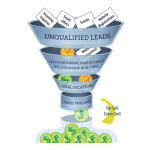Management Consulting Essentials: Positioning
 I meet and talk with a lot of independent management consultants. 99% of them are extremely busy. They are so busy that they have little time to learn new approaches, keep up with the development in their area(s) and develop their business. Most of them even complain that they are too busy. They also use their busyness as an “excuse” for not being responsive and not meeting deadlines.
I meet and talk with a lot of independent management consultants. 99% of them are extremely busy. They are so busy that they have little time to learn new approaches, keep up with the development in their area(s) and develop their business. Most of them even complain that they are too busy. They also use their busyness as an “excuse” for not being responsive and not meeting deadlines.
When I ask why they are so busy the unison answer is: “client projects”.
My response is: “Fantastic, you are having fun, learn a lot and make tons of money?”
Answer: “Silence.”
The silence continues when I ask them: “When will you increase your prices and with how much?”
This series of posts will address the “many hours/low price” issue, explain the causes and provide recommendations for how you can remedy the situation. Applying the ideas should enable you to work less hours, make more money and have more fun at the same time.
Supply and demand
 I am an economist by education and an international business man by trade. I have learned and experienced that when demand increases with supply fixed the price should increase. Then why is it apparently so difficult for independent management consultants to increase their prices, when they are so busy? I have made a small collection of reasons or “excuses” from the answers I get on my questions above and from my observations in general.
I am an economist by education and an international business man by trade. I have learned and experienced that when demand increases with supply fixed the price should increase. Then why is it apparently so difficult for independent management consultants to increase their prices, when they are so busy? I have made a small collection of reasons or “excuses” from the answers I get on my questions above and from my observations in general.
I’d like to share my observations and recommendations with you in this series of posts. The first post will be about positioning. This post is NOT about pricing. I’ll get to the pricing subject in a later post.
The positioning of a management consultant
Take a look at the web sites and blogs of independent management consultants and you will find some of the answers to their troubles.
One of the most important parameter in conveying the value of your services is associated with your positioning or your brand.
Most independent management consultants choose a very broad positioning. They communicate working cross industries and mastering many areas such as strategy consulting, executive recruitment, coaching, interim management, sales optimization, mergers & acquisitions, Go-To-Market strategy development, channel development, IT procurement consulting, vendor contract review consulting and even more.
The reason for applying a broad positioning is to appear relevant for as broad an audience as possible. The consultant believes that the broader his brand they more consulting assignments he will be considered for.
Unfortunately reality works exactly the opposite way.
The broader you position yourself the less “special” you are. You appear to do what many others consultants can do and you will be compared with consultants who are exactly specialized in each of the areas you pretend to cover.
By applying a broad positioning you dilute your value.
Your current clients and people you already know may engage you because they are familiar with your personal qualities, but they will most likely expect not to pay premium fees. New clients will find you uninteresting. You appear as a “jack of all trades, master of none.” Some may engage you if your fees is substantially lower than the “specialist” and that’s exactly the trap. You’ll get low paid assignments and you will need to work many hours just to make a reasonable income.
The sharp positioning
Applying a sharp positioning obviously requires that you are sharp. If you claim to be a specialist in a certain discipline and/or in a certain industry, you must be able to back it up with your resumé and client references.
Most independent management consultants are previous middle managers, sales executives, country managers or CEOs. Their challenge is that they are not really special, nor are they consultants.
My recommendation is to look at what you have done so far. Look at your previous experience (your resumé) and you clients. Look at what you really like to do. Spend some time considering what your specialty should be in the future – based on those areas where you can prove it. Don’t rush. Take your time. Talk to your spouse and close friends about it. Download a couple of books on the subject and read them. Check the web.
When you are ready fill in these two sentences:
- In the future my speciality will be to help clients [max 20 words and no fluff]
- That I am a specialist in this area and this industry is proven by [max 20 words]
(You are welcome to send your drafts to me if you would like a second opinion.)
From this day on you are going to build your position and reputation as a specialist. You will find Linkedin groups where this specialty is discussed. Your web site will be about this speciality, you blog will communicate that this area is your passion and focus, you will join associations and network communities where this specialty is exercised.
The consulting assignments you will get from now on will reinforce your position as a specialist.
How long does it take to become a specialist?
Well, maybe you are already a specialist. If you truly are a generalist I would say 3 months! Too good to be true?
If you choose an area where you have more than 5 years of operational experience, if you download and read 5 books on the subjects, if you subscribe to Google Alerts on the subject and if you mix with the subject community I will guarantee you that within three months you will know more about this subjects than 99% of the potential clients you will meet.
You will not become a recognized specialist in 3 months, but you will be on your way.
The opportunity (and danger) of the sharp positioning
When you get assignments as a specialist you can ask higher rates. When working on client assignments you will discover consulting opportunities in areas outside your specialty. Your clients will even ask you to provide consulting on urgent issues, which are not within your field of expertise. And they will even be prepared to pay your specialist fees for the additional services.
But don’t give in to the temptation! There are good reasons why you should never accept any assignments outside you area of specialty:
- You cannot provide top performance outside your specialty. You risk doing a mediocre job and ruin your reputation.
- Assignments outside your specialty dilute your position.
- You miss an opportunity to pass the lead to someone you know and who has this areas as her specialty. You collect a finders fee or a commission. You now have someone working for you, where you make money without spending hours!
- Declining an assignment and referring to someone else is probably the strongest signal you can send a client that you care about her business.











